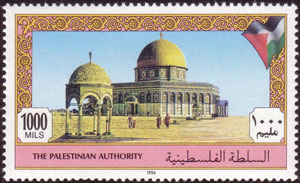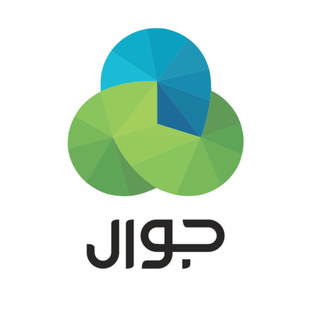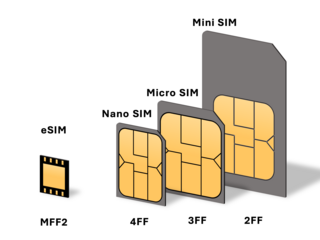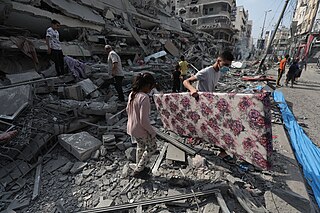
Communications in the State of Palestine occur across many media, including telephone, radio, television, and internet. [1] The telecom infrastructure is growing at a very rapid pace and continually being updated and expanded.

Communications in the State of Palestine occur across many media, including telephone, radio, television, and internet. [1] The telecom infrastructure is growing at a very rapid pace and continually being updated and expanded.
There are several palestinian internet and telephone companies, major ones are:
The Israeli Ministry of Communications has control over the cellular communications and technology Palestinians may build, which has been limited to 2G. [5] Israeli bombardment, electricity blockades and fuel shortages have caused the near-total collapse of Gaza’s largest cell network providers. [6] There are two mobile operators in the Palestinian territories: Jawwal with 2.9m customers, [7] and Ooredoo with 400,000 customers.
There are 25 licensed FM stations broadcasting in the Palestinian territories.
FM Stations
On October 1, 1999, the International Telecommunication Union assigned the call block E4A through E4Z to Palestine. Aircraft tail numbers, amateur radio stations, vessels at sea and other radio facilities licensed by the Palestinian Authority will carry call signs beginning with "E4."
In 2008 opennet stated "Access to Internet in the Palestinian territories remains relatively open, although social filtering of sexually explicit content has been implemented in Gaza. Internet in the West Bank remains almost entirely unfiltered, save for a single news Web site that was banned for roughly six months starting in late 2008. Media freedom is constrained in Gaza and the West Bank by the political upheaval and internal conflict as well as by the Israeli forces." [8]
On 23 April 2012, EFF published a list of websites censored by some Palestinian ISPs. [9] That same day, the Tor Project announced that they are witnessing politically motivated censorship in Bethlehem. [10]
In May 2012, the Ma'an news agency stated "The Palestinian Authority has quietly instructed Internet providers to block access to news websites whose reporting is critical of President Mahmoud Abbas." [11]
Palestine Post is responsible for providing postal service in West Bank, while the Ministry of Telecom and Information Technology of the State of Palestine is responsible for postal service in the Gaza Strip. Generally, international letters addressed to West Bank are routed through both Jordan and Israel and the international letters addressed to Gaza are routed through only Israel. Delays often happen during sending and receiving letters from Palestine. Without these two national postal authorities, no international courier service would be serving the areas.[ citation needed ]
During the 2023 Israel–Gaza war, telecommunications company Paltel kept its networks online for most of the first six weeks. The company has a network operations center in Ramallah, West Bank. As of 2023, Paltel has 750 staff in Gaza, and they perform maintenance tasks such as repairing and refueling generators when an outage is detected. Five Paltel staff have been killed in the conflict. Paltel networks are essential for coordinating emergency services and humanitarian aid, and for documenting conditions inside Gaza. [12]
In response to previous wars in Gaza, Paltel has made preparations and has many contingencies to help keep its networks online. It buries its cables very deep (up to 26 feet), and has multiple power sources available such as batteries, solar panels, and generators. Ultimately, Paltel is reliant on Israel, because its two main fiber optic cables pass through Israel. Israel has turned off telecommunications by interfering with these cables twice before. [12]
On November 3, 2023, the BBC World Service launched an emergency radio service for Gaza, [13] broadcasting on long-range AM from the British East Mediterranean Relay Station, to "provide listeners in Gaza with the latest information and developments as well as safety advice on where to access shelter, food and water supplies". [14]
On November 16, 2023, due to fuel shortages, Internet and telephone services went down in Gaza. This also resulted in a suspension of humanitarian aid convoys because humanitarian agencies could not communicate. [15] On November 18, services were partially restored, after some fuel was allowed in and allocated to telecommunications. [16] On November 21, an Israeli strike against a telecommunications tower in North Gaza led to a telecommunications blackout in that area. [17]
An organisation called Connecting Humanity provides internet access to people in Gaza using donated eSIMs, allowing them to connect to networks outside of Gaza. [18] [19] [20] By December 2023 200,000 people living in Gaza (around 10% of the population) had received internet access through an eSIM. [21] [22] [23]
Telecommunications in Kazakhstan include radio, television, fixed and mobile telephones, and the internet.
Posts and telecommunications have long played an essential role in Lebanon, a small country with an expansive diaspora, a vivid media landscape, and an economy geared toward trade and banking. The sector's history has nonetheless been chaotic, marked by conflict but also, and perhaps most importantly, a deeply rooted legacy of state control, weak competition, and intense politicization. A combination of poor services and high prices culminated in popular protests against the government's attempt, in October 2019, to tax the widely used messaging service WhatsApp. The anger this measure triggered captured a more general sense of dissatisfaction, and contributed to tipping the country into a protracted crisis. Civil unrest coincided with Lebanon's default on its ballooning debt; in the ensuing economic collapse, telecommunications have been among the infrastructure most affected.
Telecommunications in the Philippines are well-developed due to the presence of modern infrastructure facilities. The industry was deregulated in 1995 when President Fidel Ramos signed Republic Act No. 7925. This law opened the sector to more private players and improved the provision of telecom services are better and fairer rates, leading to the creation of many telecommunication service providers for mobile, fixed-line, Internet and other services.

Communications in Somalia encompasses the communications services and capacity of Somalia. Telecommunications, internet, radio, print, television and postal services in the nation are largely concentrated in the private sector. Several of the telecom firms have begun expanding their activities abroad. The federal government operates two official radio and television networks, which exist alongside a number of private and foreign stations. Print media in the country is also progressively giving way to news radio stations and online portals, as internet connectivity and access increases. In 2012, a National Communications Act was also approved by Cabinet members, and 2 October 2017, the president of Somalia Finally signed the National Communications Law, and became the official Law that regulated the ICT industry. Under that Law, National Communications Authority (NCA) of the federal Republic of Somalia has been established, with board of directors and a general manager. Somalia currently is ranked first in Africa for most affordable mobile data per gigabyte and 7th in the world.

Telecommunications in Armenia involves the availability and use of electronic devices and services, such as the telephone, television, radio or computer, for the purpose of communication. The various telecommunications systems found and used in Armenia includes radio, television, fixed and mobile telephones, and the internet.

Telecommunications in Israel are the most developed in the Middle East. Israel's system consists of coaxial cables, optical fibers, and microwave radio relay. Prior to the 1990s, Israel's telecommunication market was dominated by Bezeq, a government-owned corporation. During the 1990s, the Israeli telecommunication industry transitioned from government owned monopolies to diversified private competition by a range of new companies. As of 2014, the telecommunications sector in Israel had revenues over ₪15 billion, representing about 2% of the GDP.

Palestine, officially known as the State of Palestine, is a country in the Levant region of West Asia. It is officially recognized as a state by the United Nations and numerous countries. Palestine shares borders with Israel to the west and north, Jordan to the east, and Egypt to the southwest. The state comprises the West Bank, including East Jerusalem, and the Gaza Strip. The population of Palestine exceeds five million people, and covers an area of 6,020 square kilometres (2,320 sq mi). Jerusalem is its proclaimed capital and the official language is Arabic. The majority of Palestinians practice Islam, while Christianity also has a significant presence.

Bezeq is an Israeli telecommunications company. Bezeq and its subsidiaries offer a range of telecom services, including fixed-line, mobile telephony, high-speed Internet, transmission, and pay TV.

Demographic features of the population of the area commonly described as Palestinian territories includes information on ethnicity, education level, health of the populace, economic status, religious affiliations and other aspects of that population.
The Coordinator of Government Activities in the Territories is a unit in the Israeli Ministry of Defense that engages in coordinating civilian issues between the Government of Israel, the Israel Defense Forces, international organizations, diplomats, and the Palestinian Authority. It is the main organ remaining of the mostly defunct Israeli Civil Administration, which had governed the West Bank and the Gaza Strip between 1981 and 1994.

The country calling code +970 is reserved for telephone numbers in the State of Palestine.

The Palestinian National Authority began in 1994 to issue stamps and operate postal services as authorized by the Oslo Accords.

The following outline is provided as an overview of and topical guide to the State of Palestine:

Palestine Telecommunications (Paltel) Company, listed in the Palestine Exchange (PEX) as PALTEL, is a telecommunications holding company consisting of Palestine Telecommunications (Paltel), Palestine Cellular Communications Ltd. (Jawwal), internet provide Hadara, Reach call center, and Palmedia broadcast media.

Palestine Cellular Communications Company, trading as Jawwal, is a Palestinian communications company providing cellular and wireless communications. Jawwal operates in the West Bank and Gaza Strip as part of Paltel Group.

An eSIM (embedded-SIM) is a form of SIM card that is embedded directly into a device. Instead of an integrated circuit located on a removable SIM card, typically made of PVC, an eSIM consists of software installed onto an eUICC chip permanently attached to a device. If the eSIM is eUICC-compatible, it can be re-programmed with new SIM information. Otherwise, the eSIM is programmed with its ICCID/IMSI and other information at the time it is manufactured, and cannot be changed. Different mobile telephones may not support an eSIM, may have a permanently programmed, unchangeable one, or one that can be reprogrammed for any carrier that supports the technology. Phones may support physical SIMs only, eSIM only, or both.
Ibrahim Kharman is a Palestinian businessman. He is the Deputy CEO of the Palestine Telecommunications Group (Paltel) and the Chief Commercial Officer of Paltel Group. The Palestinian Communications Group is a public shareholding company established in 1995 in the Palestinian Autonomous Areas of the Palestinian National Authority It is the largest employer in Palestine.

The Gaza Strip is experiencing a humanitarian crisis as a result of the Israel–Hamas war. The crisis includes both a famine and a healthcare collapse. At the start of the war, Israel implemented a complete blockade on the Gaza Strip, which has resulted in significant shortages of fuel, food, medication, water, and essential medical supplies. This siege resulted in a 90% drop in electricity availability, impacting hospital power supplies, sewage plants, and shutting down the desalination plants that provide drinking water. Widespread disease outbreaks have spread across Gaza.
Connecting Humanity is a collective which provides internet access to people in Gaza using donated eSIMs, allowing them to connect to networks outside of Gaza. It is run by Mirna El Helbawi, an Egyptian journalist, writer and activist.

Mirna El Helbawi is an Egyptian journalist, writer, podcaster and activist. She founded and runs Connecting Humanity, a non-profit organisation which helps people in Gaza to regain access to the internet, using donated eSIMs. She was nominated for the Arab Journalism Award in 2016.